GMC Terrain
Front Brake Pads Replacement Guide
How to change the front disc brake pads
on a 1st generation 2010-2016 GMC Terrain with photo illustrated steps.
By Paul B. Michaels Author & Photographer Auto Mechanic Since 1989 |
||
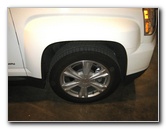 2016 Terrain Front Wheel |
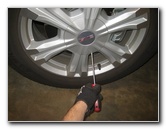 Pry Out Plastic Hub Cap |
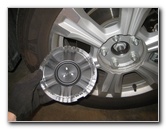 Hub Cover Removed |
| This
automotive maintenance tutorial was specifically written to assist
owners of the first generation (2010, 2011, 2012, 2013, 2014, 2015 &
2016) GMC Terrain in changing the front disc brake pads and
lubricating the caliper slider pins. Owners of other General Motors vehicles such as the Buick Verano, Regal, LaCrosse, Cascada, Encore, Enclave, Envision, GMC Canyon, Sierra 1500, Acadia, Yukon, Denali, Savana, Spark, Sonic, Cruze, Malibu, Impala, Volt, Camaro, Corvette, SS, Trax, Equinox, Traverse, Tahoe, Suburban, Colorado, Silverado and Express may also find these DIY instructions to be helpful. The tools and other items required to complete this procedure include a flathead screwdriver, a lug nut wrench, a floor jack, two jack stands, a 14mm socket, a 3/8" drive ratchet, an 18mm wrench, a "C" or "F" clamp and a tube of synthetic brake parts lubricant grease. A few compatible replacement sets of new front brake pads with their part numbers are as follows: Akebono ACT924, Wagner ThermoQuiet QC1421, ACDelco 17D1421CH, Dura International BP1421 C, ACDelco 14D1421CH, Centric 105.11251, Bosch BE924H, Raybestos PGD1421C and ACDelco 171-1072. |
||
|
|
||
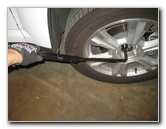 Slightly Loosen Lug Nuts |
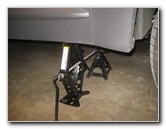 Raise Front of SUV |
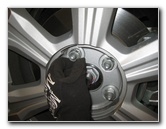 Spin Off 5 Lug Nuts |
| The first few steps
are to park the SUV on a level surface and turn off the engine. Engage the emergency / parking brake and chock both sides of the rear wheels to prevent the car from moving. Use a flathead screwdriver or a plastic automotive pry bar tool to remove the plastic hub cap in the center of the wheel. Look for the notch on the hub cover and gently pry it out. Set the plastic wheel hub cap aside in a safe place. Slightly loosen the 5 lug nuts on the front wheel by turning them counterclockwise with the tire iron. Raise the front of the SUV with the floor jack and securely support it with at least two jack stands. I prefer to work on one side of the vehicle at a time to keep three wheels on the ground for extra safety. Spin off the five lug nuts and set them aside in a safe place. |
||
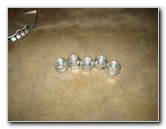 Five Lug Nuts Removed |
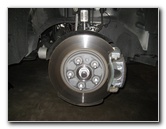 Rotor, Bracket, Caliper |
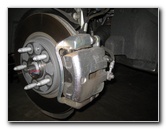 Front Brake Caliper |
| Remove the front
wheel and set it aside in a safe place. Once the front wheel is out of the way, you'll see the rotor, bracket, caliper and suspension. The front brake caliper is held in place to the bracket by two bolts on the back side of the caliper. The bolt heads face in towards the engine bay. |
||
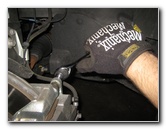 Loosen Top 14mm Bolt |
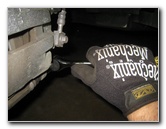 Loosen Bottom Caliper Bolt |
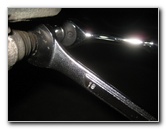 18mm Wrench - Slider Pin |
| Loosen the upper
caliper bolt by turning it clockwise (as seen from the outside of the
vehicle) with the 14mm socket and a 3/8" drive ratchet. Then loosen the lower 14mm caliper bolt by turning it clockwise (as seen from the outside of the car). If the caliper slider pins rotate as you are trying to loosen the caliper bolts, hold them in place with an 18mm wrench. |
||
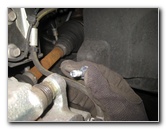 Spin Out Upper Bolt |
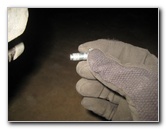 Remove Lower Bolt |
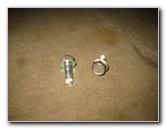 2 Caliper Bolts Removed |
| Spin out the two caliper bolts and set them aside in a safe place. | ||
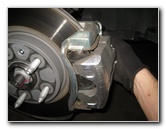 Pull Caliper Out of Bracket |
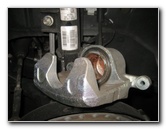 Rest Caliper On Suspension |
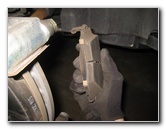 Wear Bar - Top Inner Pad |
|
Pull the caliper out of the bracket and off the old pads. Carefully rest the caliper on the suspension or suspend it from the spring with a bungee cord. Try to avoid kinking, bending, pulling or stressing the rubber brake line. Remove the old inner and outer brake pads from the caliper bracket. Make a mental note of where the wear indicator or "squeal" bar is situated on the old pads. On this 2016 Terrain SLT, the wear bar was located at the top of the inner brake pad. |
||
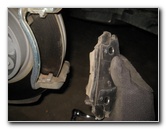 Remove Old Outer Pad |
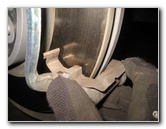 Replace Pad Abutment Clips |
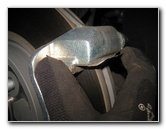 Upper Pad Abutment Clip |
| I recommend buying
either the Akebono ACT924 or the
Wagner ThermoQuiet QC1421 front
brake pads since they have excellent reviews on Amazon. If your new set of pads included replacement brake hardware, remove the old pad abutment or "anti-rattle" clips out of the top and bottom of the bracket. Apply a small amount of brake caliper grease on to the bracket and new pad abutment clips where they will come in contact with each other or with the new brake pads. (Do not get any grease on the rotor.) |
||
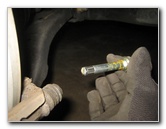 Remove Caliper Slider Pins |
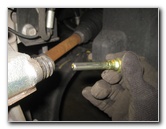 Top Caliper Slider Pin |
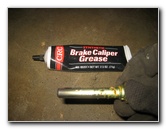 Lubricate & Replace Pins |
| In order for the
caliper to operate smoothly, the two caliper slider pins or "guide pins"
need to be well lubricated. Pull the two caliper slider pins out of their rubber dust boots at the top and bottom of the bracket. Apply a thin layer of brake parts lubricant grease to each pin before pushing them back in to place. Thoroughly clean off the brake rotor, caliper bracket, brake caliper assembly and the lug nut studs with brake parts cleaner spray. Do not use compressed air or blow with your mouth to clean off the brake parts since breathing in brake dust can be harmful to your health. Brake dust can be carcinogenic (causes cancer) if inhaled.
To remove the existing rotors and install new ones, just remove the single Torx T30 set screw and remove the two 18mm bolts on the rear of the caliper bracket that attach it to the steering knuckle. Then loosen the old rotor with a rubber mallet, pull it off, and slide the new one in its place. The torque specification in the service manual for the front bracket bolts is 140 lb-ft (or 190 N*m). |
||
|
|
||
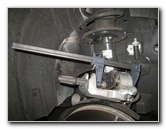 Attach "F" Clamp to Caliper |
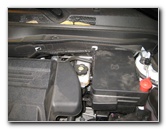 Brake Fluid Reservoir |
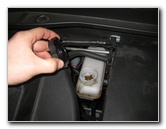 Twist Off Plastic Cap |
| The caliper piston
will need to be compressed back in order for it to fit over the thicker new
brake pads. Attach the "F" clamp to the caliper and use the back of an old brake pad to evenly distribute the pressure across the piston. Move to the right rear area of the engine bay and twist off the brake fluid reservoir cap in the counterclockwise direction. |
||
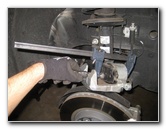 Slowly Compress Piston |
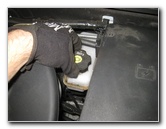 Replace Brake Fluid Cap |
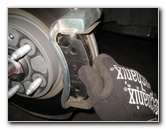 Install New Outer Pad |
| Removing the brake
fluid reservoir cap will allow the fluid to more easily travel back through
the system when you compress the caliper piston. Slowly turn the "F" clamp handle in the clockwise direction while repeatedly checking the brake fluid level in the reservoir to make sure that it doesn't over flow. Clean up any spilled brake fluid immediately since it can easily damage painted surfaces. Continue pushing back the caliper piston until it flush with the rubber dust boot surrounding it. Try to avoid pinching or otherwise damaging the rubber dust boot surrounding the caliper piston. Replace the brake fluid reservoir cap as soon as possible. Brake fluid is hygroscopic (absorbs moisture from the air) so it can become contaminated if left exposed for too long. |
||
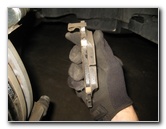 Install New Inner Pad |
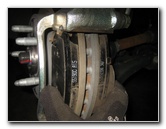 Push Pads Against Rotor |
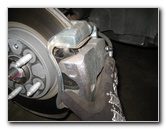 Lower Caliper Over Pads |
| Install the new
inner and outer brake pads in to the bracket. The wear indicator or "squeal" bar should be situated at the top of the new inner brake pad. Push the two pads together until they are flush against the rotor. Carefully lower the caliper over the new brake pads and in to the bracket. |
||
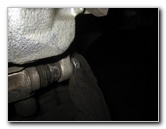 Spin In Bottom Caliper Bolt |
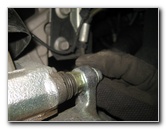 Replace Top Caliper Bolt |
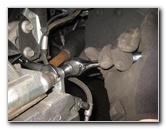 Tighten Counterclockwise |
| Line up the bolt
holes in the caliper with their corresponding holes in the caliper slider
pins within the bracket. An optional step is to apply some Loctite Blue (medium strength) threadlocker to the caliper bolts to prevent them from vibrating loose. But properly tightened caliper bolts should not become loose. Spin in the two caliper bolts a few turns by hand in the counterclockwise direction to prevent them from becoming cross threaded. Tighten the upper and lower caliper bolts in the counterclockwise direction (as seen from the outside of the SUV) with the 14mm socket and 3/8" drive ratcheting wrench to just past hand tight or about 20 ft-lbs of torque. The torque specification in the service manual for tightening the 14mm front caliper bolts is 20 lb-ft (or 27 N*m). |
||
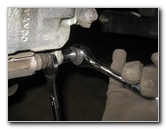 Hold Slider Pin - 18mm |
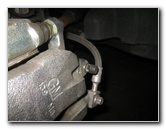 Rubber Valve Cap |
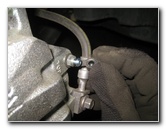 Brake Fluid Bleeder Valve |
| If the caliper
slider pins rotate as you are attempting to tighten the caliper bolts, hold
them in place with an 18mm wrench. Double check that the two caliper bolts are tight before moving on to the next steps. If your brake pedal previously felt soft, "mushy" or spongy, the brake fluid might be contaminated with water or the brake lines may contain some air bubbles.It would be best to bleed the brake lines at this time in order to flush out the old fluid and replace it with fresh DOT3 brake fluid. For more on this topic, check out my Brake Line Fluid Bleeding With An Assistant DIY Guide or alternatively the Brake Line Fluid Bleeding With A Power Bleeder Guide. |
||
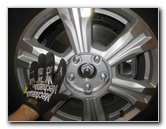 Replace Front Wheel |
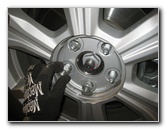 Spin On 5 Lug Nuts |
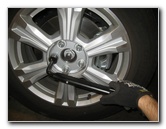 Slightly Tighten Clockwise |
| Replace the front
wheel and spin on the five lug nuts in the clockwise direction by hand to
prevent them from becoming cross threaded.
Slightly tighten the five lug nuts in the clockwise direction with the tire iron. |
||
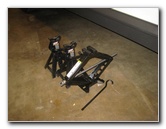 Lower SUV From Stands |
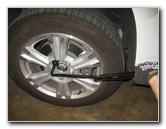 Torque To 140 ft-lbs |
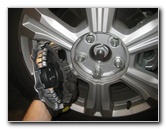 Plastic Hub Cover |
| Carefully lower the
SUV from the jack stands by using the floor jack. Progressively tighten the six lug nuts in a "criss cross" or "star" pattern to about 1/4 to 1/2 turn past hand tight. It would be best to use a torque wrench or an electric impact wrench with a torque stick to tighten the lug nuts to 140 lb-ft of torque. |
||
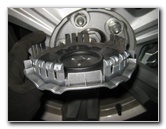 Line Up Large Plastic Tab |
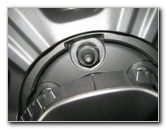 Plastic Tab & Cut Out Area |
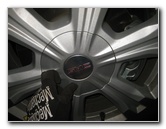 Push On Hub Cap |
| Line up the large
plastic tab on the back side of the hub cap with the cut out section on the
wheel. Gently push the hub cover back in to place until it is flush with the outer face of the wheel. Sit in the driver's seat of the vehicle and firmly push the brake pedal a few times to restore the brake line pressure. Check the brake fluid in the reservoir and verify that it is at the proper level. If it is low, pour in some new DOT 3 fluid. To break in your new front brake pads, just drive normally for the first several hundred miles while avoiding any hard or "panic" stops which may glaze over the new brake pads and cause them to be noisy and possibly not perform as well. It's also a good idea to regularly check your driveway for drops of brake fluid which may indicate a leak, check the brake fluid level in the reservoir and also check that the lug nuts are still tight. For more,
check out my other
2010-2016 GMC Terrain DIY Repair & Maintenance Guides. |
||
| If you found this guide to be helpful,
please consider making a small donation by clicking on the PayPal.com
"Donate" button located to the right of this paragraph. Thank you!
(Note: I am not a registered charity. Donations are not tax deductible.) |

